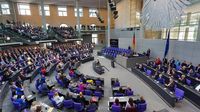On May 6, 2025, Friedrich Merz, the leader of the CDU, faced an unprecedented setback in the Bundestag when he failed to secure the necessary majority in the first round of voting for Chancellor. Merz garnered only 310 votes in a secret ballot, falling short of the required 316 votes. This surprising outcome marks the first time in the history of the Federal Republic of Germany that a designated Chancellor has not achieved a majority after coalition negotiations.
According to Bundestagspräsidentin Julia Klöckner, who announced the results, out of 630 members of parliament, 621 participated in the vote, with 307 opposing Merz, three abstentions, and one invalid vote. The CDU/CSU and SPD coalition together holds 328 seats, indicating that 18 votes were needed from within their ranks for Merz to succeed.
In the aftermath of the vote, both Merz and SPD co-chair Lars Klingbeil expressed confidence in securing a majority in the next round. Klingbeil stated, "I have not the slightest indication that the SPD was not fully standing," referring to the strong support from party members, which he claimed was an order to the faction to fulfill its obligations.
However, dissatisfaction among some members of both the Union and SPD was reported as a contributing factor to Merz's failure. Political analysts suggested that some MPs may have felt overlooked in the new government structure or had fundamental reservations about Merz's leadership.
In response to the failed vote, Jens Spahn, the leader of the Union parliamentary group, announced that the coalition would propose Merz again for a second ballot within the next two weeks, as stipulated by Article 63 of the Basic Law. This article allows the Bundestag to elect a Chancellor within 14 days if the proposed candidate does not receive the necessary votes. During this period, any number of ballots can be held with different candidates, but the absolute majority of 316 votes is still required.
If no candidate secures the majority within the two weeks, the requirements will be lowered, allowing the candidate with the most votes to be elected. This would mean that a simple majority would suffice. Bundestag rules dictate that if no election occurs within this time frame, a new vote must take place immediately.
Despite the turmoil, the current Chancellor, Olaf Scholz, will continue to conduct official business until a successor is appointed, as per Article 69 of the Basic Law. The ongoing political landscape remains tense, with various factions calling for stability and unity.
Following the vote, the political climate in Berlin shifted dramatically. CDU-Generalsekretär Carsten Linnemann reported that Merz was greeted with "frenetic applause" from his party members, suggesting that there remains a solid base of support within the CDU. On the other hand, the AfD, led by Alice Weidel, criticized the coalition, stating that the results demonstrated how weak the coalition was, calling for Merz to step down and pave the way for new elections.
Franziska Brantner, leader of the Greens, lamented the failed election, arguing that it not only weakened the future government but also eroded trust in democracy. She emphasized the need for a capable government to address the challenges facing Germany and Europe.
Meanwhile, Jan van Aken, the leader of the Left Party, framed the result as a vote of no confidence against Merz, questioning how he could gain the trust of citizens if he could not secure support from his own party. He criticized Merz for failing to distinguish himself from the AfD, suggesting that this lack of clarity contributed to the dissatisfaction among voters.
The political discourse surrounding the failed election reflects deep divisions and a sense of urgency among party leaders. CSU Chairman Markus Söder urged all democrats to work towards establishing a stable government, emphasizing that it is not the time for vendettas or political games.
As the political landscape unfolds, the SPD recently presented its cabinet ministers, consisting of four women and three men, signaling a commitment to a diverse and inclusive government. The coalition partners, including Merz, Klingbeil, and Söder, have expressed a desire to convince citizens of their capability through reforms and investments, with economic stability being a top priority.
Looking ahead, the outcome of the next vote will be crucial not only for Merz's political future but also for the stability of the coalition government. Observers are keenly watching how the dynamics within the Union and SPD will play out in the coming days, as the parties prepare for what could be a pivotal moment in German politics.
In conclusion, the failed election of Friedrich Merz as Chancellor highlights the fragility of the current coalition government and sets the stage for a critical period of negotiations and potential re-evaluations of party loyalties and strategies. As the Bundestag prepares for another round of voting, the political stakes have never been higher.






